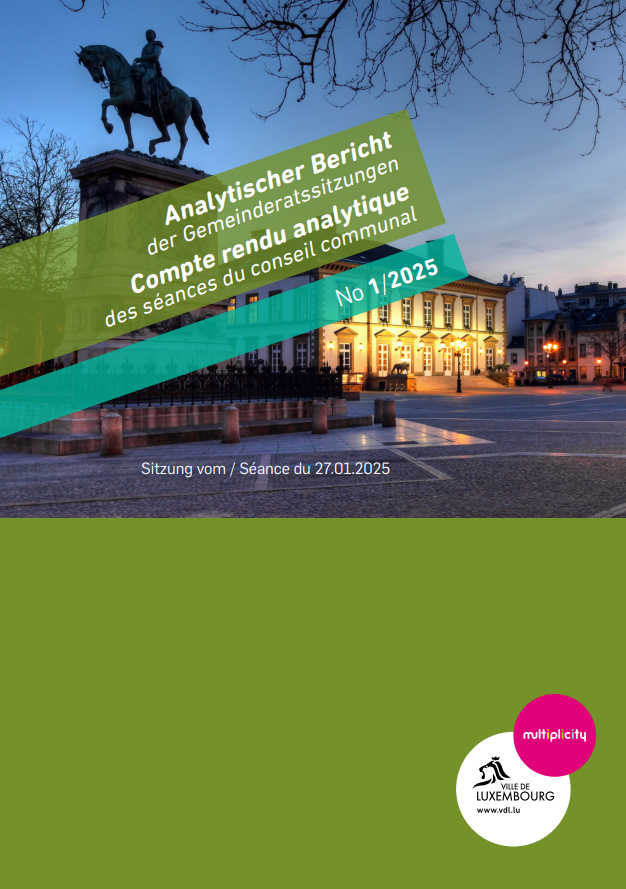Closed session
1. Municipal Hospices: personnel matters – opinion.
2. Personnel matters – decision.
Open session
3. Questions asked by Municipal Councillors.
4. Traffic: permanent amendments to the traffic regulations – temporary regulations – confirmation of temporary regulations – decision.
5. Agreements – approval.
6. Urbanisme (Urban Planning)
- Classification of the buildings located at 21, rue Aldringen and 3, rue Beck as national cultural heritage assets – opinion.
- Classification of the building located at 2, boulevard Konrad Adenauer as a national cultural heritage asset – opinion.
- Classification of the building located at 146, rue Jean-François Boch as a national cultural heritage asset – opinion.
Download
7. Multi-year funding plan – presentation.
8. Allocation of special grants – decision.
9. City of Kyiv – Donation of generators – decision.
10. Amendment of the amended municipal regulation of 10 February 2012 introducing a social solidarity benefit (règlement communal du 10 février 2012 créant une allocation de solidarité) – decision of the Municipal Council of 16 December 2024 – amendment of the date of entry into force – decision.
11. Legal affairs: authorisations to initiate legal proceedings – decision.
12. Creation/abolition of staff positions – decision.
Live broadcast of meetings
Watch the video recording of this session.
Summary record
The summary record is a transcript of the discussions held and decisions taken by the municipal council. As such, it is an important source of information for citizens of the capital with regard to projects and measures that could have an impact on their daily life.
The summary record of this session will be made available shortly.
Keep reading

Keep reading

Questions asked by Municipal Councillors
Awareness campaign on violence against women
Question posed by Antonia Afonso
Raising awareness is an essential part of Orange Week 2024, which aims to combat domestic violence against women. In Luxembourg, as in other major European cities, a number of initiatives addressing this issue are already being undertaken.
The City of Verona has undertaken an interesting and easy-to-implement initiative whereby public awareness messages are displayed on public benches. I have attached a picture to my written question. In the picture we can see a bench that is painted red, displaying the message, "La panchina del rispetto contro la violenza sulle donne", which translates as, "This bench is opposed to violence against women".
Since there are many benches throughout Luxembourg City's parks, green spaces and playgrounds, we would like to ask the College of Aldermen to consider implementing a similar initiative here. Besides the city's parks, the initiative could also be implemented in other public spaces, such as in the vicinity of train stations and outside take-away restaurants.
The messages could be displayed in several languages, for example, Luxemburgish, French, German, English and Portuguese.
Would the College of Aldermen be willing to implement such an initiative?
Response provided by Alderman Maurice Bauer
First of all, I would like to thank Councillor Afonso for this interesting question. As she has rightly pointed out, Luxembourg City has already implemented quite a number of initiatives to draw attention to this important issue. The College of Aldermen and the Equal Opportunities Commission are always open to suggestions. However, we do not believe that the solution lies in benches that are painted red. That would set a precedent, and other associations with equally noble goals would more than likely approach the City to have similar initiatives undertaken on their behalf.
The College of Aldermen, the Municipal Council and the Equal Opportunities Commission already support initiatives addressing this issue throughout the year. For many years now, the City of Luxembourg has been implementing action plans in which gender-based violence is an important aspect. We try to reach the general public through different channels, such as information and awareness events, the screening of themed films at the Cinémathèque, campaigns to raise awareness of female genital mutilation and femicide, etc. And, of course, we are involved in Orange Week every year. We also take steps to raise awareness among our own staff, and work closely with various associations. A decision was recently taken to allow the association "Femmes en détresse" to use the old presbytery in Belair to provide accommodation for nine women.
So, to avoid setting a precedent, we will not be installing benches that have been painted red. Nevertheless, I would like to thank Councillor Afonso again for this question, which draws attention to a very important issue.
The association CASA
Question posed by Christa Brömmel
For many years, the association CASA (Centre d'appui social et associatif) has been an integral part of the association landscape in Luxembourg City and further afield. In addition to providing advice, CASA organises language courses, training in culture-related subjects, and a number of other activities. It also sells products from Portugal at the city's weekly market. The association's head office is located in a building that belongs to the City of Luxembourg.
According to recent press reports, a number of irregularities have been uncovered, raising serious questions. Several people who had been hired by the association, thanks to ADEM funding, have reportedly been dismissed. The association's management has been criticised, and doubts have been raised as to the accuracy of its accounts. The question therefore arises as to whether there could be repercussions for the City of Luxembourg.
And it is precisely for that reason that I would like to know what exactly CASA's partnership with the City of Luxembourg, as mentioned on the association's website, entails. What does the partnership entail in financial terms? How was the partnership formalised, and how is it regulated? Does the City exercise any form of control or supervision? Does CASA pay rent for the building where its head office is located, and which it uses for activities that it organises? How much rent does it pay? What are the association's obligations as regards the use of the building? In the College of Aldermen's view, what repercussions could the recent revelations have for the City of Luxembourg?
Response provided by Mayor Lydie Polfer
The City of Luxembourg granted CASA permission to use the premises on Montée de Clausen – the premises where the association's head office is located – in 1980, that is to say, 45 years ago. At that time, there were many immigrants from Portugal arriving in Luxembourg and, of course, the City supported all of the work done to give them a place where they felt welcome and where they could access courses and other activities.
The building was made available to CASA in 1980 for the symbolic price of one euro. In a new agreement concluded with CASA in 2022, it is stipulated that the building is being provided for the purpose of "providing social and association support for Portuguese speakers, promoting their integration in Luxembourg public life, and combating all forms of exclusion, by offering courses and support in a number of different domains, such as social, legal and administrative matters, language, music and IT courses, psychological support, and painting and sewing classes." On the first floor of the building is a flat that the City agreed could be used by the President of the association in the form of "tied accommodation". The monthly rent was initially set at 7,000 Luxembourg francs, but was subsequently adjusted. CASA was also granted the use of a warehouse in an old building near the service station in Eich.
The facts reported in the press in recent weeks are outside the scope of the City's remit. The City has absolutely nothing to do with the labour contracts that were mentioned. As you know, the director of ADEM has already responded. If the investigation currently in progress reveals a breach of trust in CASA's relationship with the City, the City will have to reconsider the situation. However, to date, we have not received any information that warrants taking such steps.
Christa Brömmel: So, permission was granted to use the building in 1980, for the symbolic price of one euro. I assume that the tasks of adjusting the rent for the tied flat, and establishing who is entitled to use it, are handled by the relevant City department. As regards CASA's partnership with the City of Luxembourg, I would like to know whether the City receives reports from CASA, for example annual activity reports. In other words, how does the City monitor compliance with the terms and conditions of the agreement?
Mayor Lydie Polfer: The procedure is exactly the same as for other communities, such as, for example, the Cape Verdean community, to which the City has also granted the use of a building for the symbolic price of one euro. One of the City's policy objectives is to provide the various communities in Luxembourg City with opportunities for them to meet up and to feel more welcome in society in general. Through its activities, CASA is very much involved in helping us achieve this objective. I have never heard anyone complain about this to date. As regards the labour contracts that were mentioned, it is up to the parties concerned to take the necessary steps themselves. If CASA is found to have deliberately committed any wrongdoings, the City would, of course, be prepared to re-examine the situation.
Idea put forward by residents to form a citizens' militia in the Gare district
Question posed by Christa Brömmel
I am sure that I wasn't the only one who was alarmed to learn that certain residents of the Gare district have been promoting the idea of forming a citizens' militia. The residents involved justify their approach by claiming that it is the only way for them to respond to the untenable situation in certain streets in the district.
According to the definition found on Wikipedia, a "militia" always has a military aspect: they are described as being non-regular armed forces that support combat troops or as combat units whose members are civilians. This obviously raises a number of questions and, in my view, promoting such ideas is extremely dangerous. I was pleased to learn that Mayor Lydie Polfer reacted with similar concerns. What does the College of Aldermen think of the fact that most of the people on the City's advisory committees have spoken out on this issue, and have questioned the State's monopoly on the use of legitimate violence?
Can the College of Aldermen confirm the residents' claims that criminal activities and cases of anti-social behaviour have increased since the beginning of winter? What are the figures to support these claims?
The question as to whether the College of Aldermen would tolerate the formation of a citizens' militia has already been answered.
What has the City done since 2023 to improve the situation in the Gare district? What additional measures is the College of Aldermen considering?
Another source of dissatisfaction could be the fact the works in Rue de Strasbourg – which cause local residents considerable inconvenience – have still not been completed. When will the redevelopment works – which were initially scheduled for completion by spring 2024 – be finally completed? What are the reasons for the delays?
Given that the situation in the Gare district cannot be improved by the City alone, I would like to know what concrete measures the College of Aldermen has requested of the state authorities – the police, the judiciary, the Ministry of Health, the Ministry for Family Affairs, etc. – since 2023, and what results have been achieved.
Response provided by Mayor Lydie Polfer
Thank you for this question, which gives me another opportunity to address the issue of the situation in the Gare district.
I will begin with the easiest question, that is to say, the works in Rue de Strasbourg. For a number of reasons, they have been delayed by more than 100 days, but should be finally completed by autumn 2025.
Clearly, a citizens' militia is totally unacceptable. But it is equally clear that the residents of the Gare district will no longer tolerate the type of situation that they have faced on a daily basis for many years now. And for many years now, we have taken these concerns very seriously, unlike perhaps the Déi Gréng party. I don't know whether you are indifferent to what has been widely reported in the press over recent weeks, such as, for example: "The Gare district is turning into a powder keg", and "The Gare district has become an open drug market". The City also regularly receives messages from residents describing what they are confronted with when they open their front door in the morning, with photographic evidence. You simply cannot imagine what they are confronted with every day. For too long, various parties have failed to take this issue seriously.
In fact, the idea of forming a citizens' militia, as proposed by certain residents, is nothing new: similar plans were announced back in 2017/2018 by a group of citizens who had reached the end of their tether. In response, the College of Aldermen engaged a security firm. I don't need to remind you what the reaction of the Déi Gréng group, and other political parties on the Municipal Council, was: they felt that such a measure was awful, and contrary to the public authorities' – i.e., the police's – monopoly on the use of legitimate violence, which no one has ever questioned. The residents continue to endure the situation in the Gare district, and we take their plight very seriously.
Over the past ten years, I have sought relentlessly to engage in dialogue with the residents and the police but, despite all of the discussions and our own efforts, we have not always obtained the results that we would have liked. I am glad that we now have a Minister for Police, who is at least attuned to the issue, even though he obviously cannot change things overnight. The local police force has increased its presence and can now perform its preventive role much more effectively.
As has already been reported in the press, I sent the Prime Minister a letter on 10 January 2025, asking him to convene a round-table meeting with the ministers concerned – Police, Justice, Family and Health – with a view to finding solutions.
In France, Belgium and The Netherlands, drug-related crime has escalated to extremely worrying proportions in recent years. This state of affairs is not without consequences for Luxembourg, and we need to address the problem together, without casting blame on anyone.
The fact that residents came up with the idea of forming a citizens' militia should also give Déi Gréng's representatives pause for thought, as it is a clear sign that people are concerned. I hope that, in the weeks to come, we can announce a series of concrete measures.
I have discussed the matter with the Minister of Police, and with the parents of children who attend school in the Gare district. Security firms – which opposition representatives have claimed to be illegal and anti-constitutional – now patrol the area around the school, and the situation has improved considerably. Security guards are stationed at the cultural centre, and at the entrance to the school. These are some of the measures that we have taken directly, since it is totally unacceptable for children to be exposed on a daily basis to the type of situation shown in the pictures that have been sent to us. I hope that no one in this assembly feels that this is normal. I hope that we can work with everyone involved to find solutions, because things cannot go on like this. We will leave no stone unturned. In the coming weeks, I will keep you up to date on the concrete outcomes of the meetings with the relevant ministers. At the next meeting of the Municipal Prevention Committee (Comité de prévention communal), which is scheduled to be held in the coming weeks, the police will provide specific statistics on trends in criminal offences and covering other aspects.
Christa Brömmel: I would like to respond briefly to your insinuation that we are not interested in the issues that have been mentioned. We submitted our written question precisely because we feel that the call to form a citizens' militia is indeed very worrying. We did not do so simply to annoy the College of Aldermen. We did so because it is an issue that is genuinely of interest to us. No one in this assembly has said that things are easy, simple or simplistic.
Mayor Lydie Polfer: I would just like to make it clear to the members of the Municipal Council that we are not going to have a general discussion on this topic today. We have already discussed this issue on several occasions. But since it is safe to assume than everyone here would like to have their say on the matter, I suggest that the Municipal Councillors request that an item on this topic be added to the agenda for the next Municipal Council meeting, so that all parties can express their views. That concludes my response to Councillor Brömmel's question.
Christa Brömmel: I have the right to ask an additional question.
Mayor Lydie Polfer: I simply said that the situation in the Gare district is not new, and that, unfortunately, over the past few years, we have not been listened to properly. Let me be even more precise. We will have the opportunity to discuss the matter in more detail at the next session, if a member of the Municipal Council is brave enough to request that it be added as an item on the agenda. We would welcome the addition with pleasure!
Christa Brömmel: You claimed that we said nothing on this issue. I asked a question here to find out more about this issue. You have been a member of the political majority for many years, and you have been trying to deal with the issue. And it would appear that the citizens feel that things are not progressing as they should. That is why we submitted our question in writing. Thank you for your explanations. I note that you are not yet able to provide the figures that we asked you for, and I hope that they will be presented to us at the Municipal Prevention Committee meeting. I am glad, of course, that you have clearly spoken out against the formation of a citizens' militia, and that under no circumstances would you tolerate such a move, even if it were proposed by representatives of your own party on the City's advisory committees. Thank you very much.
Mayor Lydie Polfer: We therefore agree on that point.
Rehousing of tenants facing eviction
Question posed by David Wagner
My question concerns a report that I read on RTL (https://infos.rtl.lu/actu/luxembourg/a/2269852.html: "Expulsion de locataires à Luxembourg / Jacqueline, 92 ans, est forcée de déménager (Eviction of tenants in Luxembourg / Jacqueline, 92, forced to move): 'C’est le pire choc de ma vie' ('The worst experience of my life')."
Several cases have been highly publicised in the press, most notably those of elderly women living in Merl, who have to move out of their flats because their landlord has told them that their building is going to be renovated. One of the individuals concerned is a 92-year-old woman who has been living in her flat for around 50 years and has nowhere else to go. The current legislation is clear, and although the College of Aldermen has no responsibility in the matter, municipal authorities have a duty to provide emergency accommodation for residents who lose their homes. One of the women concerned has to leave her flat by the end of the month. The 92-year-old woman, who is totally distressed, has five months to leave her flat. What can be done to rehouse the people concerned?
This is not simply a financial issue, it also highlights the issue of the vulnerability of elderly people who have to cope on their own in a new home, without their circle of friends. A number of inter-generational housing projects also exist, which could provide a solution in this particular case.
Response provided by Mayor Lydie Polfer
We have looked into this matter, and it turns out that the actual situation is different from what was reported, as is often the case: the tenants' leases have indeed been terminated but, according to the information at our disposal, eviction proceedings have not yet begun. As you know, such proceedings can be lengthy. If anyone is evicted, the municipal authorities would indeed be required to provide them with emergency accommodation. And we would do so.
Article 13, paragraph 3 of the Municipal Law establishes that each member of the Municipal Council, acting in their individual capacity, shall enjoy the right of initiative to add to the agenda drawn up by the College of Aldermen one or more proposals that they wish to submit to the Municipal Council.
Such proposals must be submitted to the mayor in the form of a written reasoned request at least three days before the meeting of the Municipal Council.









